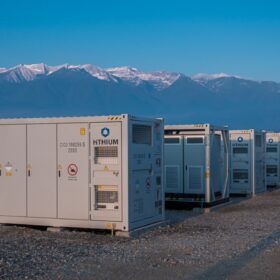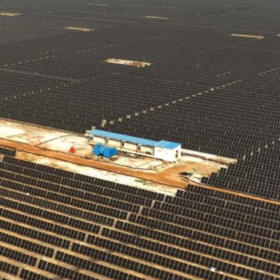Top News
Waaree Energies secures 300 MW solar module order from Sembcorp Green Infra

GEON launches inverter with inbuilt lithium battery for homes

Bulgarian tender awards more than 4 GWh of energy storage capacity across 31 projects
SunRise Arabia Clean Energy Conference 2026
Join the 3rd SunRise Arabia Clean Energy Conference on April 22, 2026, in Riyadh to explore how solar PV and energy storage are powering the Kingdom’s growing digital economy — including data centers. Secure your spot at the early-bird rate.
Battery Business & Development Forum 2026
Connect with Europe’s energy storage leaders at the Battery Business & Development Forum 2026 in Frankfurt (March 31–April 1) and gain insights into evolving business models, financing strategies, and market trends
Out now - pv magazine Global Winter Edition
The new pv magazine Global edition is out now!
Available in print and digital – get your copy today!

NTPC switches on 359.58 MW solar

Bhutan tenders 120 MW solar project
KP Group to invest INR 36,000 crore in Botswana’s renewable energy sector
‘The real cost of a battery storage goes far beyond $/kWh’
Tata Power plans INR 6,500-crore, 10 GW solar ingot and wafer factory
Markets & Policy
Featured
Powering India’s digital transformation: The backbone technologies you don’t see
The future of impact funding: Aligning capital with sustainable outcomes
The largest area of green financing is energy-efficient machinery, which supports MSMEs in modernising production lines and reducing operational energy consumption. Significant capital is also being channelled into rooftop solar installations, electric vehicles, and enterprises operating in the water, sanitation, and hygiene (WASH) sectors, across clusters such as manufacturing, healthcare, and food processing.
Maxeon expands legal action against Aiko and its distributors in Germany
Maxeon has filed a lawsuit in Germany claiming Aiko Solar, and four of its German product distributors, breached a patent related to its back contact solar technology. It is the third such lawsuit Maxeon has opened against Aiko.
New report charts path to securing raw material supply chains for India’s EV growth
A new report by KPMG outlines strategies to enhance resilience and competitiveness in India’s electric vehicle (EV) ecosystem amid sharply rising demand for critical raw materials such as lithium, nickel, cobalt, and rare earth elements.
Jakson to set up high-tech solar PV module recycling line in partnership with Europe’s Ecoprogetti
Jakson Engineers Ltd will set up a high-tech solar PV module recycling plant capable of recycling around 5,00,000 PV modules, or approximately 13,500 tonnes of modules per year, recovering critical materials and enabling responsible end-of-life solar management. The recycling line will be supplied by Ecoprogetti.
Canada opens review into anti-dumping duties on Chinese PV modules, laminates
Canada’s International Trade Tribunal is running an interim review of the country’s anti-dumping and countervailing duties on solar modules and laminates from China, following a request to exclude flexible solar panels that affix to curved surfaces.
Installations
Why EPC leaders must diversify across energy transition and digital infrastructure
NTPC’s 735 MW Nokh solar project now fully operational
NTPC’s 735 MW (3 × 245 MW) Nokh solar project in Jaisalmer district, Rajasthan, has become fully operational following the recent commissioning of the final 78 MW capacity at Plot-1.
Wood Mackenzie predicts 2-year decline in global solar inverter demand
Wood Mackenzie’s latest analysis expects market uncertainty in China, Europe and the U.S. to cause two consecutive years of contraction in the global solar inverter market, forecasting a fall to 577 GWac this year and 523 GWac in 2026.
ReNew secures long-term agreement with Google for 150 MW solar project in Rajasthan
Following this solar agreement, ReNew’s committed commercial and industrial (C&I) portfolio expands to 2.7 GW (2 GW commissioned and 700 MW under construction). Additionally, it has 700 MW in the pipeline.
Italy assigns 1.1 GW in PV auction open to projects with ‘non-Chinese’ modules
The procurement exercise, the second solar auction under Italy’s Fer X incentive scheme and first to exclude the use of Chinese solar modules, cells and inverters for projects above 1 MW in size, concluded with a final average price of €0.06637/kWh.
GameChange Solar secures 1.2 GWp tracker order for Khulis PV plant in Saudi Arabia
GameChange Solar has been selected to supply its Genius Tracker 1P system for the Khulis solar PV independent power plant, being developed by ACWA Power.
Technology
Featured
The Hydrogen Stream: IIT Kanpur, HBTU to jointly establish Centre of Excellence for Green Hydrogen in Uttar Pradesh
Solex Energy partners with Malaysia’s TT Vision on solar manufacturing automation and talent development
Solex Energy Ltd has signed a non-binding Memorandum of Understanding (MoU) with Malaysia-based automation technology company TT Vision Holdings Berhad to collaborate on advancing solar manufacturing automation, engineering excellence, and talent development in India.
MIT-WPU researchers develop safer liquid hydrogen transport system
Researchers at India’s MIT World Peace University (MIT-WPU) have developed a Liquid Organic Hydrogen Carrier (LOHC) system capable of transporting hydrogen in a stable liquid form that is non-flammable, non-explosive, and manageable at normal temperatures and pressures. This breakthrough removes one of the biggest barriers slowing the widespread adoption of hydrogen in India.
Smart Joules raises $10 million in Series B funding from Neev II Fund, Waaree Renewable Technologies, and Spectrum Impact
Smart Joules will use the proceeds to expand its energy-efficiency and cooling operations into newer sectors and larger-scale projects, including manufacturing, building automation, and district cooling, while further strengthening the company’s technology, analytics, and on-ground execution capabilities.
From waste to wealth: Circular strategies driving a sustainable India
The promise of India’s circular economy lies in its ability to turn environmental challenges into engines of growth. Achieving it will take investment, innovation, and clear ways to measure progress.
Keeping the smart grid cyber secure
As smart grid tech is rolled out around the world to modernize legacy assets and integrate renewable energy generation, it is also making the electricity network more prone to cyber attacks. IEC Standards provide protection but they also are challenged to keep up with the latest threats.
Manufacturing
Featured
Attero announces INR 150 crore investment to expand e-waste and copper recycling capacity across India
Astronergy launches 750 W anti-dust TOPCon solar module
The Chinese manufacturer said its new Astro 7 TOPCon module features an innovative self-cleaning frame and a power conversion efficiency of 23.2%.
Waaree secures ALMM approval for 5.25 GW solar cell capacity
Waaree Energies’ advanced solar cell manufacturing facility located at Degam, Chikhli, Navsari (Gujarat) has been ALMM enlisted with a total approved capacity of 5.25 GW per annum. This includes 3,923 MW of n-type TOPCon cells and 1,328 MW of p-type PERC bifacial cells.
RenewSys secures 300 MW POE encapsulant supply order from ICON Solaren
RenewSys has secured an order to supply its latest-generation POE (polyolefin elastomer) encapsulants to ICON Solaren, supporting the production of high-efficiency solar modules. POE delivery is scheduled between January 2026 and April 2026.
Onix Solar secures INR 148.80 crore non-DCR module order from Vikran Engineering
Onix Solar will design, manufacture, and supply 193,550 non-DCR TOPCon 620 Wp solar modules for the Vikran project.
The Hydrogen Stream: Europe forecasts €240 billion for hydrogen grids to 2040
The European Commission says its new grids package includes €240 billion ($281.8 billion) for hydrogen networks to 2040, alongside fresh Italian State aid for clean tech deployment.
Energy Storage
Featured
Bihar selects GreenCo Energies, Sun Petrochemicals for 2.12 GW of pump storage projects
Amazon leads funding round for US silicon solid-state battery maker
Blue Current, which has a pilot production line in California, will use funding from an $80 million financing round led by Amazon to advance commercialization of its silicon solid-state battery technology for stationary storage and mobility applications in the United States.
India sees dramatic plunge in battery storage costs, Ministry reports
Market trends suggest battery energy storage systems (BESS) will likely operate 1.5 cycles per day, bringing the effective storage cost down to just INR 2.8/kWh (0.031/kWh), the Ministry said on Monday.
Naxion Energy launches India’s first sodium-ion energy storage systems
Naxion Energy (formerly Sodion Energy) has introduced its sodium-ion–based energy storage systems for the residential and commercial & industrial sectors. The storage systems are available in 3.5 kW, 5 kW, and 10 kW models, and the batteries can be expanded to double the system’s storage capacity.
THDC commissions Unit-3 of 1 GW pumped storage project in Tehri
THDC India Ltd., a subsidiary of NTPC Ltd., has commissioned Unit-3 (250 MW) of its 1 GW (4×250 MW) variable-speed pumped storage hydropower project in Uttarakhand.
Batteries now cheap enough to make dispatchable solar economically feasible
A new analysis from energy think tank Ember shows that the cost of storing electricity with utility-scale batteries has fallen to just $65/MWh as of October 2025 outside China and the US, making it economically feasible to deliver solar power when it is needed.
Opinion & Analysis
Featured
China module market watches 2026 export rebate signals as polysilicon consolidation platform company is registered
Solar surge in Northern India as Cyclone Ditwah cuts irradiance in the south and Sri Lanka
In a new weekly update for pv magazine, Solcast, a DNV company, reports that November brought above-average solar conditions in northern India and Pakistan, while southeastern India and Sri Lanka faced reduced solar output due to Cyclone Ditwah’s storms and heavy cloud cover. Despite southern disruptions, India’s renewable energy share rose, driven by strong solar generation in the north and overall growth in renewable capacity.
The skills gap, not capital, is India’s real green energy bottleneck
The renewable energy sector creates significant employment density—approximately 10 times more workers per MW in solar and 3–4 times more in wind than in conventional power plants. This employment multiplication should be our competitive advantage. However, the skills gap is creating economic inefficiencies that compound across the sector.
The sustainability advantage: Why HJT’s low-temperature manufacturing process matters?
As adoption accelerates, the critical question is no longer simply how much solar capacity can be installed, but how clean and sustainable the manufacturing process behind it truly is. Heterojunction Technology (HJT) has become one of the most compelling answers to that challenge.
What Delhi’s pollution crisis means for renewable adoption.
India’s renewable capacity target represents necessary but sufficient progress toward climate stabilization. Delhi’s pollution demonstrates that energy supply-side transformation alone cannot deliver intended outcomes. Transport emissions, industrial activity, and residential heating must undergo equal transformation.
OPIS Global Polysilicon Marker holds firm as trade barriers continue driving fragmentation
In a new weekly update for pv magazine, OPIS, a Dow Jones company, provides a quick look at the main price trends in the global PV industry.





